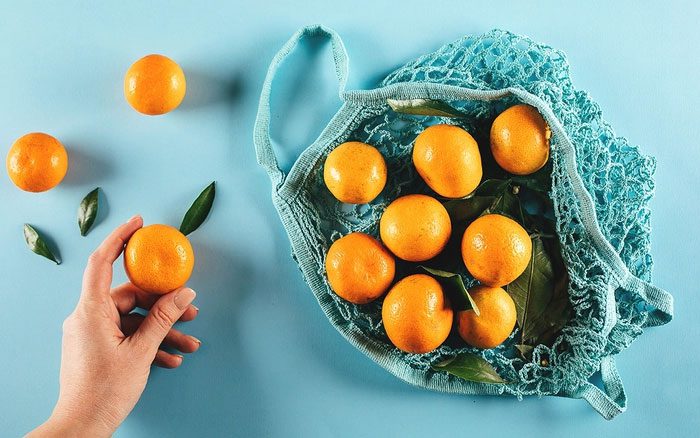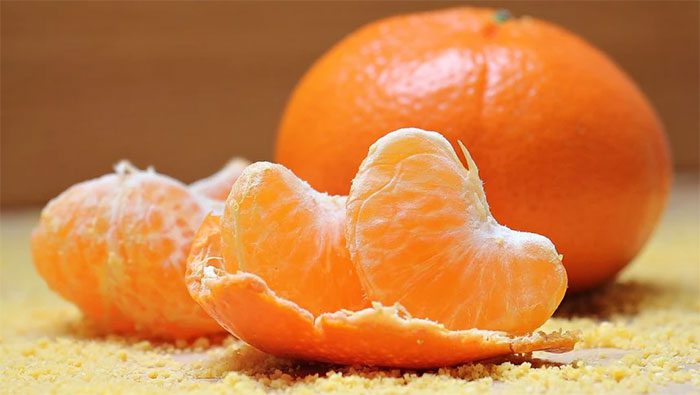Not only a delicious fruit, it is also a valuable herbal remedy as all parts are used for healing.
According to Specialist Doctor II Huỳnh Tấn Vũ from the University of Medicine and Pharmacy in Ho Chi Minh City, mandarins were highly esteemed in ancient times because every part was used as medicine. Ancients referred to mandarins as “golden jewels”. In China, mandarins are considered a fruit that brings good luck and are often consumed on wedding nights. In modern medicine, the segments, peel, and seeds of mandarins are all renowned medicinal ingredients.

Mandarins were highly esteemed in ancient times.
The flesh of mandarins has a sweet and sour taste, is warm in nature, and is effective in moistening the lungs, quenching thirst, and stimulating appetite. Mandarin flesh contains sugars, proteins, lipids, vitamins, organic acids, and minerals. It is beneficial for those with high blood pressure, coronary artery disease, stomach pain, malnutrition, and weakness after illness.
The peel of mandarins, known as Chen Pi, is warm in nature and helps strengthen the stomach, dissolve phlegm, treat coughs, relieve wind, promote urination, and alleviate belching and epigastric pain. The peel contains fragrant essential oils, glucosides, orange aldehyde, and fatty acids that stimulate the heart, inhibit stomach, intestinal, and uterine movements…
“The mandarin peel is also a valuable remedy for treating high blood pressure and myocardial infarction. It is effective for conditions such as qi stagnation in the spleen and stomach, bloating, digestive disorders, poor appetite, nausea, excessive phlegm cough, and discomfort in the chest…”, Dr. Vũ stated.
The fibers of mandarins are bitter, neutral in nature, and contain vitamin P, which helps prevent and treat high blood pressure and is particularly beneficial for the elderly. The fibers also help regulate qi, dissolve phlegm, and relieve pain, commonly used for treating coughs, chest tightness, and hemoptysis.
One part often discarded when eating mandarins is the seeds. Mandarin seeds are also a valuable medicinal ingredient. They are bitter, neutral in nature, and effective in regulating qi, reducing pain, and dissolving lumps, often used to treat hernias, swollen painful testicles, back pain, and mastitis.
According to Dr. Vũ, even mandarin leaves were historically used for medicinal purposes. Mandarin leaves are bitter, neutral in nature, and help support liver function, regulate qi, reduce swelling, and dissolve lumps, used to treat conditions like rib pain, hernias, breast pain, and lumps in the breast.

Mandarins are a valuable herbal remedy. (Illustrative image)
The roots of the mandarin tree are also used to treat toothaches and skin abscesses. For those suffering from rheumatism, back pain, or body aches, the recipe is: 16g mandarin roots, 12g earthworm, 12g achyranthes, and 8g angelica. All ingredients are chopped, boiled with water, or soaked in alcohol for consumption. They can also be boiled down to a paste and mixed with alcohol for use.
Some herbal remedies using mandarins
Below, Dr. Vũ introduces several effective remedies using the fruit, peel, leaves, and roots of mandarins:
- Treating colds: 30g fresh mandarin peel, 15g windbreaker herb, add 3 cups of water, boil down to 2 cups, sweeten and drink one cup hot, after half an hour, reheat and drink the remaining cup.
- Treating coughs due to wind-heat: 20g mandarin root peel, 10g mulberry root peel, 10g licorice root or leaves (or 5g Chinese licorice). All three ingredients should be sliced thin, dried, and boiled with 400ml of water until reduced to 100ml, add sugar, and divide into 2-3 portions for consumption throughout the day.
- Treating dysentery: 20g mandarin stem bark, 20g pomegranate peel, 20g banana peel, 20g rosehip root, 10g guava buds, chopped, dried, and boiled for drinking.
- Treating vomiting: 10g mandarin peel, 15g loquat leaves boiled for drinking.
- Treating excessive phlegm cough: 8-16 green mandarins, mixed with 1 teaspoon of sugar or honey, a little table salt, and 5g soot (burned from wood). All ingredients are steamed for 15-20 minutes, then mashed, mixed well, and divided into 2-3 portions for drinking throughout the day.
- Treating abdominal, back, and knee pain: 15-30g mandarin roots boiled for drinking.
- Treating tooth decay: Clean mandarin roots, add a little salt to chew and hold in the mouth.
- Treating skin abscesses: Use equal parts mandarin roots and alcohol residue, pound finely, heat, and apply to the abscess.
- Treating swelling and blood stasis: 40g mandarin leaves, divided into 2 parts, one part dried and toasted for drinking; the other part fresh, pounded, and applied to the wound. Continuously apply for 3-4 days.
- Treating flu and headaches: Boil mandarin leaves, lemongrass, chrysanthemum, peppermint, grapefruit leaves, and lemon leaves for drinking and steaming to induce sweating.
- Treating snake bites: A handful of mandarin leaves, washed, pounded, add a little salt and a cup of boiled water cooled, strain for drinking and use the residue to apply to the wound.
- Mastitis: 30g fresh mandarin seeds, add some alcohol, roast dry, and boil for drinking.
- Excessive phlegm cough: 10g red sand (a type of processed mandarin peel), 3g Chinese herb powder, and 15g processed loquat leaves, boiled for drinking.
- Chronic rib pain: 10g mandarin fibers (sand lạc), 10g green mandarin peel, 10g nutmeg, boiled for drinking.
The strange stone that grows like mushrooms after rain


















































